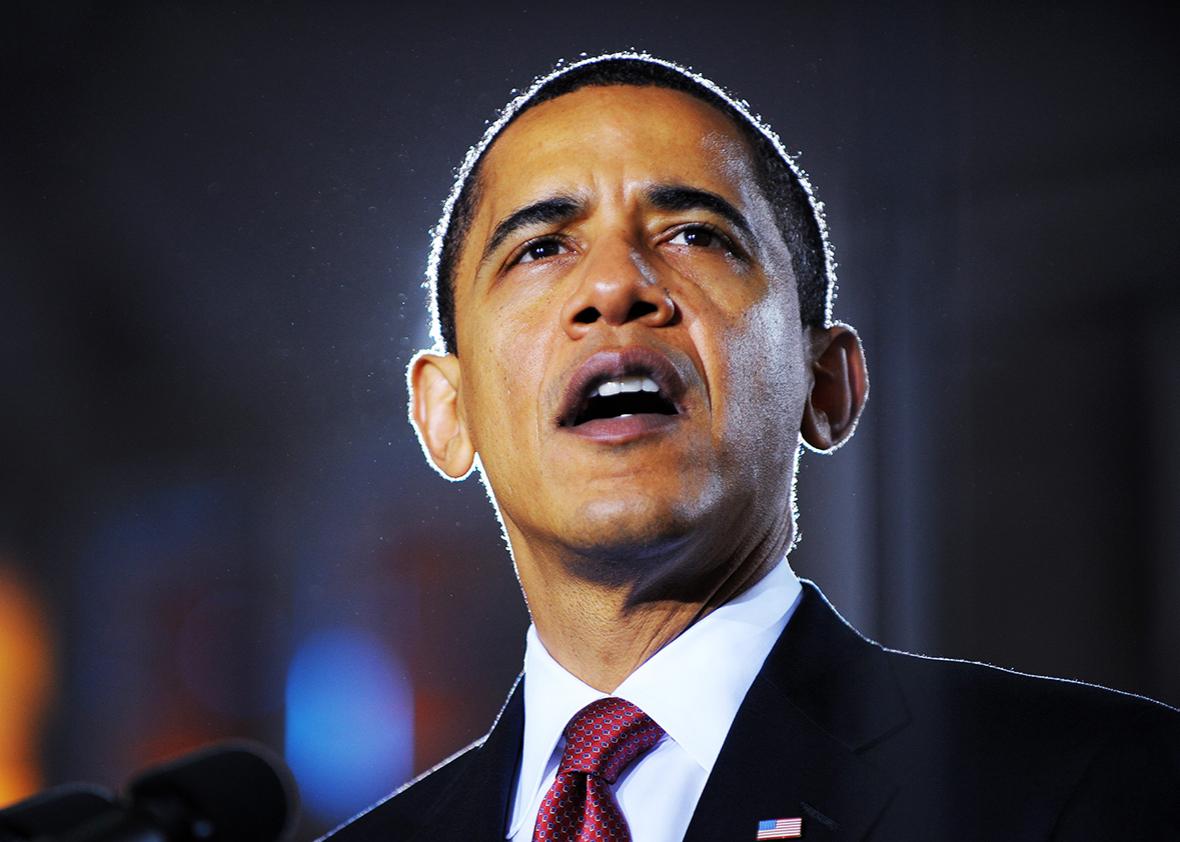Barack Obama is a relatively popular politician, itself quite an accomplishment in the Age of No National Politicians Being Popular. Once he retires from the Oval Office and the public firing line, history will begin to buff his halo, the way it has with other recent ex-presidents. Like him or not, he has been an iconic figure in American history since the day he won the 2008 election. He still has a long life ahead of him. One would expect him to spend his post-presidency on something commensurate with this lofty status. Ending global hunger? World peace? The elimination of death? The death of sadness?
Eh, he can get to all that jazz eventually. But first: How about working on some state legislature campaigns?
The Democratic Party, “in close consultation with the White House,” has launched a new political group “which will coordinate campaign strategy, direct fundraising, organize ballot initiatives and put together legal challenges to state redistricting maps,” Politico reported Monday. Former Attorney General Eric Holder will chair the new group, named the National Democratic Redistricting Committee. And Obama himself, as Politico writes, has “identified the group … as the main focus of his political activity once he leaves office.” The group will focus on the “gubernatorial, state legislative and House races” in 2018 and 2020 that will determine the design of the next congressional redistricting maps.
Why would Obama concern himself with such seemingly small-fry politics? One reason could be tradition: Ex-presidents like to give their successors room to breathe, so hieing off to state-level battles is one way for Obama to remain active without meddling in the day-to-day grind of national politics. The other, more important reason is that control of state legislatures is in no way small-fry politics. By throwing his name behind the effort, Obama is trying to fix the colossal infrastructural damage his party sustained under his tenure: the Republican state-level domination—and thus congressional domination—achieved first in the midterms of 2010 and iced in 2014.
What happened in the 2010 “Tea Party wave” election, anyway? President Obama has a go-to explanation. “We just didn’t pay a lot of attention to politics that first year,” he told New York magazine in a recent interview, “and the [2010 Senate special election] loss in Massachusetts reminded me of what any good president and any good elected official needs to understand: You’ve got to pay attention to public opinion, and you have to be able to communicate those ideas.”
The explanation is a self-flattering one: We were just so busy implementing perfect policies that we forgot to communicate them properly. One doubts that a more cleverly crafted party message—nipping and tucking an adjective here or there in public speeches—would have overridden the factors that led to Democrats’ catastrophic 2010 losses. The flat economy, the party-line stretch to pass the Affordable Care Act, the gravitational pull that was bound to drag Democrats down to Earth after their big successes in the 2006 and 2008 congressional elections. It was the election that finally saw conservative whites switch jerseys in states with long Democratic state-level traditions, while governorships and chambers across the Rust Belt states fell into Republican hands and haven’t been recovered since.
The 2010 elections may have tethered the Republican Party to a base-centric strategy that’s made it agonizingly difficult for them to retake the White House. But the damage it did to the prospects of the Democratic Party at the sub-presidential level is no less rotten. It was a census year, i.e. the best cycle for a party to have a “wave” election. The pickups in governorships and state legislative chambers allowed Republicans to redraw favorable maps for themselves. In 2014, the second Republican-wave election of Obama’s tenure, the Democrats’ hole only got deeper. The GOP won 52 percent of the votes cast for the House that year but won 57 percent of the seats.
Democrats might make gains across the board in 2016 with a Clinton victory—or, more aptly, a Trump loss—but they’ll be fragile. They would once again head into midterms with the presidency, and the contemporary Democratic presidential coalition just doesn’t turn out reliably in those midterms. It will be a difficult environment for Democrats to pick up the statehouses and governorships they’ll need, whether to draw their own favorable maps or at least to block unified Republican governments from keeping the crayons and drawing whatever they want. Democrats can’t expect the 2020 presidential cycle to serve as much more of a counterweight. Hillary Clinton, who probably won’t have awe-inspiring approval ratings, will be vying for a fourth consecutive Democratic term, probably against someone who isn’t such a thick cut of Westphalian ham.
If it’s at all doable, turning around the party’s state-level health will require Democrats to avert their focus solely from the bright, shiny object of presidential races. It means getting voters from the Obama coalition to recognize that state-level races aren’t afterthoughts, and that losing the “farm team” races means dooming your preferred causes for decades at a time. Even though he won’t be in office anymore, Barack Obama will be the most famous politician in the country for the foreseeable future. For both the preservation of his legacy and his party’s future, he should be the one who grabs his coalition by the shoulders and points it toward the statehouse races. He can’t change all of the structural factors that have contributed to down-ballot Democratic suffering. But at least he can communicate the ideas.
